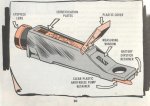dabtl
Active member
- 2,053
- 7
- 38
- Location
- Denton, Texas
I got started this morning for the North Texas Fair Parade fairly early. I was hauling politicians rather than riding with V V A 920.
I removed the cargo cover and cleared the bed of the vehicle. When I went to start it I kind of noticed I had forgotten to turn the power off a few days earlier. Ooops! No battery charge apparently. I grabbed the slave cables and jumped it off with the other deuce.
It started up around 8:30 AM and ran until 11:30 AM or so. I did not shut it off at any point. First, I have no clue how long it would take to charge the batteries and second, I was not sure if the starter relay change would solve the hot start problem I had.
It seems replacing the starter relay solved the hot start problem and the batteries turn the starter rapidly now.
So, all knowing Guru's, are the batteries charged now or should I drive it more to full charge them?
I removed the cargo cover and cleared the bed of the vehicle. When I went to start it I kind of noticed I had forgotten to turn the power off a few days earlier. Ooops! No battery charge apparently. I grabbed the slave cables and jumped it off with the other deuce.
It started up around 8:30 AM and ran until 11:30 AM or so. I did not shut it off at any point. First, I have no clue how long it would take to charge the batteries and second, I was not sure if the starter relay change would solve the hot start problem I had.
It seems replacing the starter relay solved the hot start problem and the batteries turn the starter rapidly now.
So, all knowing Guru's, are the batteries charged now or should I drive it more to full charge them?



